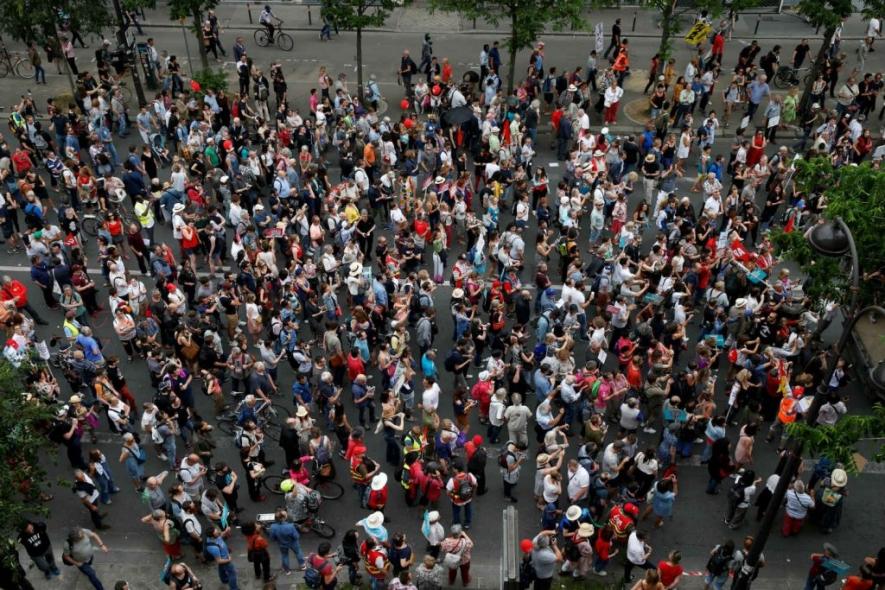Tens of Thousands Protest in France Against Macron’s Reforms

Tens of thousands of people – including railway workers, nurses, public sector employees, students and retirees – once again took to the streets in 160 different locations in France on Saturday, May 26, to protest against the reforms proposed by President Emmanuel Macron.
These slew of reforms aim at axing 120,000 public sector jobs, ending certain sick leave provisions, increasing hiring on temporary contracts instead of secured permanent employment, reducing the accessibility of students to higher education and nudging the French national railways towards privatization.
Led by the leftist political party La France Insoumise (France Unbowed), and unions including CGT, Solidaires, the Union of the Judiciary etc, the protests, backed by about 80 different organizations, saw the participation of 250,000 people across the country, and 80,000 in Paris alone, according to the CGT. The ‘moderate’ unions such as Unsa, CFDT and FO conspicuously abstained from participation on the grounds that the protests were ‘politicized’.
32 of the 43 people who were arrested were detained at the very beginning of the demonstration at Place de la Bastille, on the charges of carrying weapons or conspiring to commit violent acts. Among the arrested were two garbage collectors who reportedly stole a garbage truck with the intention of dropping the waste in front of the ruling party’s headquarters.
Nonetheless, the arrests didn’t prevent clashes between protesters and the police, who fired stun grenades and tear gas at the protesters. Hooded protesters from the group known as the black bloc – a collective of anti-capitalists with anarchist inclinations – reportedly damaged the window of an insurance agency and two bus shelters, and hurled bottles and other projectiles at the police.
The protesters were also called out for the hanging of an effigy of Macron, burning a puppet representing the president and the depiction of Macron as a Nazi officer in a poster. However, those offended by these acts seem to have failed to grasp the tremendous anger that has been building up in France, of which such acts are only a manifestation.
Since coming to power, Macron, a former investment banker, has pushed through a slew of anti-labour, pro-corporate reforms – often through decrees to avoid the parliamentary route – which have adversely affected all sections of the working class.
After Macron made multiple amendments to the French labour law in order to make it easier for employers to fire workers, thousands of lay-offs have been announced this year by private companies. Further, the government has announced plans to slash 120,000 jobs in the public sector by 2022.
Having reduced wealth tax and capital gains tax on the richer sections of the French society, Macron’s government has raised tax on pensioners by 1.7 percent, which will require them to pay an additional $31 each month from the meagre $1,600 they receive as pensions.
Plans are also in place to introduce a set of admission criteria for universities, which will effectively end the guarantee of university education for all French students with a high school diploma.
The most contentious of the proposed reforms target France’s state-owned national railway, the SNFC. The reforms seek to disenfranchize the new recruits of the special status under which almost 90% of the current SNFC employees are hired. This special status confers on the employees a high degree of job security by prohibiting employers from firing workers on the grounds that doing so would improve the company’s profit-margin.
Further, the proposal also seeks to change the legal status of SNFC from a ‘public company’ to a ‘publicly financed corporation’, which, many fear, is the first step towards privatization. The railways workers, protesting against these attempts to strip their rights and hand over the national railways to private corporations, have been on rolling strikes since the beginning of April for 2 consecutives out of every five. Days before Saturday’s protests, 95% of the railway workers voted against these proposed reforms in a company’s referendum.
Shortages in hospital staffs and lack of police in troubled neighbourhoods were some of the other issues Jean-Luc Melenchon of France Unbowed listed out while addressing the protesters.
Get the latest reports & analysis with people's perspective on Protests, movements & deep analytical videos, discussions of the current affairs in your Telegram app. Subscribe to NewsClick's Telegram channel & get Real-Time updates on stories, as they get published on our website.
























